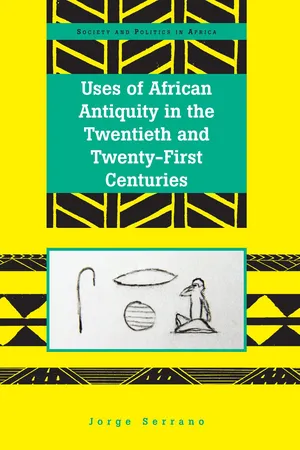
- 226 pages
- English
- PDF
- Available on iOS & Android
Uses of African Antiquity in the Twentieth and Twenty-First Centuries
About This Book
African antiquity has been discerned both nullifyingly and constructively. Uses of African Antiquity in the Twentieth and Twenty-First Centuries reveals how reading the past can be extended to understand sensitivities involving origins and how it imparts collective posture. The ancient historical imagery epitomized by writers and artists alike includes the distant past as well as an immediate past. Comparatively, representation of time long gone records transhistorical presence and civilizational participation and agentic validity. African antiquity can be construed as diasporic through time and space and in regards to nomenclature it extends understanding of peopleness, e.g. Libya, Ethiopia, Africa, Afrika, African Egypt, Kemet, Alkebu-lan, Nubia, Ta-Seti, Ta-Nehisi, Ta-Merry, Kush, Axum, Meroë, Ghana, Mali, Songhai, Zulu, and so many more are recognized in a time-spatial continuum linked to African, Colored, Negro, and Black, as various terms inform origins identity. Unfortunately, typologies disciplinarily stem from anthropological construction, yet here African antiquity as sign heralds clines and clusters; splintering Africana from humanitas ultimately contends against subjugation. African antiquity absorbs character and notions of diachronologically dispersed peoples reflect origins indulgence. African antiquity as a stretched concept and/or historicism triply adds understanding, grouping, and alterity. This primarily is a review of thinkers who defend against people erasure in the past with its socially and nihilistic affective ways.
Frequently asked questions
Information
Table of contents
- Cover
- Contents
- Preface
- Chapter 1. Melior Humanitas Atque Cultus Africana
- Chapter 2. Theoretical Multiplicity
- Chapter 3. The Afrotopic Argument
- Chapter 4. Multiplicity and Individualization
- Chapter 5. Sequela Americana
- Chapter 6. Droppin’ Knowledge
- Works Cited
- Index